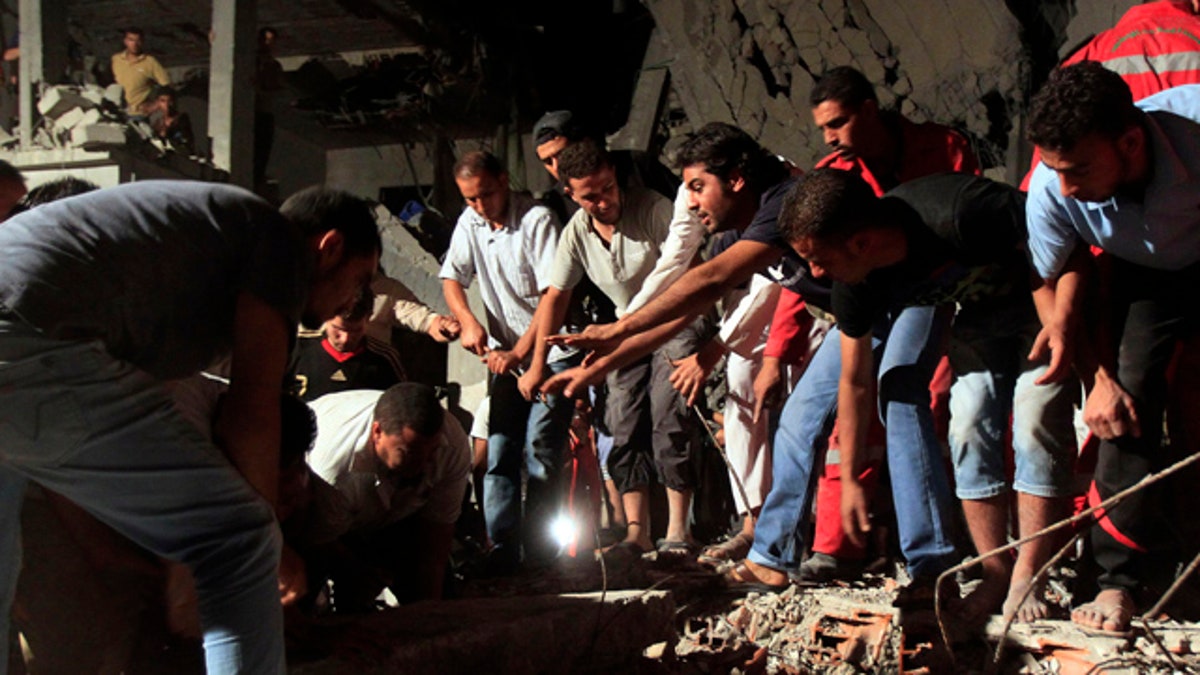
June 19: In this photo taken on a government-organized tour, Libyan firefighters and local residents remove debris from a damaged residential building. (AP)
SURMAN, Libya – Libya's government said a NATO airstrike west of Tripoli early Monday on a large family compound belonging to a close associate of Muammar Qaddafi has killed at least 15 people, including three children.
A NATO official in Naples, Italy, said the alliance has not conducted any strikes in that area in the past 24 hours. The official spoke on condition of anonymity because of NATO regulations.
Qaddafi's regime has repeatedly accused NATO of targeting civilians in an attempt to rally support against the alliance's intervention in the country's civil war. NATO has repeatedly insisted it tries to avoid killing civilians.
Libyan government spokesman Moussa Ibrahim said alliance bombs struck the compound belonging to Khoweildi al-Hamidi outside the city of Surman, some 40 miles west of Tripoli, around 4 a.m. local time Monday.
Al-Hamidi is a longtime regime insider who took part in the 1969 coup that brought Qaddafi to power. He reportedly commanded a battalion that crushed rebels in the western city of Zawiya in March, and his daughter is married to one of Qaddafi's sons, Saadi.
Ibrahim said al-Hamidi escaped the airstrikes unharmed but that three children, two of them al-Hamidi's grandchildren, were among the 15 people killed. Officials said he was inside a still-intact building at the time of the strike.
"They (NATO) are targeting civilians. ... The logic is intimidation," Ibrahim said. "They want Libyans to give up the fight ... they want to break our spirit."
Foreign journalists based in the Libyan capital were taken by government officials to the walled compound, where at least two buildings had been blasted to rubble. A pair of massive craters could be seen in the dusty ground, and rescue service workers with sniffer dogs were scouring the rubble in search of people. The smell of smoke was still in the air.
Damage could be seen elsewhere in the compound, including at a large tent where cars were kept and at circular sitting room containing old framed photos said to be of al-Hamidi. A deer kept in an enclosure with other animals had a broken antler and was bleeding from the mouth.
Another building outside the compound, next to a communications tower, was also obliterated, causing damage to an adjacent house. A mosque across the street and a school next door were not damaged.
Journalists were later taken to a hospital in the nearby city of Sabratha, where medical workers showed them the bodies of about eight to 10 people, including those of two children, said to have been killed in the strike. Some of the bodies appeared charred, while others were in pieces.
Portraits of Qaddafi hung on the hospital walls as armed men in military fatigues -- some guards from the compound -- roamed the hallways.
NATO, which has a mandate to protect Libyan civilians, has rejected the Libyan government's allegations that it targets civilians. However, mistakes have occurred.
The alliance acknowledged that one of its airstrikes on Sunday accidentally struck a residential neighborhood in the capital, killing civilians.
A coalition including France, Britain and the United States launched the first strikes against Qaddafi's forces under a United Nations resolution to protect civilians on March 19. NATO, which is joined by a number of Arab allies, assumed control of the air campaign over Libya on March 31.
From their de facto capital of Benghazi, the rebels have taken control of much of the eastern half of the country. They also control pockets in the west, mainly around the port city of Misrata and in the Nafusa mountains south of Tripoli.
In Luxembourg, the European Union foreign ministers harshly condemned the Libyan regime, saying said in a statement that "time is not on Qaddafi's side," and that the Libyan leader "has lost all legitimacy to remain in power."
The 27 foreign ministers also toughened the EU's sanctions against the regime by adding six port authorities controlled by Qaddafi's forces to its asset-freeze list. The ports were not named.
In a similar move, the central bank of the United Arab Emirates ordered a freeze on the accounts of 19 Libyan individuals and institutions while an investigation of the funds is under way into possible links to Qaddafi's regime, according to local media.
The reports gave no further details, and officials at the UAE's central bank were not immediately available for comment.








































